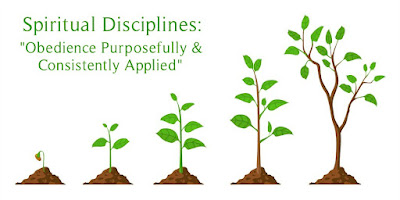Taking the responsibility to plan is underscored in several of the proverbs. “The plans of the diligent lead surely to advantage” (Proverbs 21:5a); “Commit your works to the Lord and your plans will be established” (Proverbs 16:3); and “Without consultation, plans are frustrated but with many counselors they will succeed” (Proverbs 15:22). Of course, those plans are always to be made with wisdom, in keeping with God’s overall will, and with earnest dependence on the Lord to work His purposes in (and beyond) our plans. Such proverbs as 19:21, 16:6, and several others remind us of God’s overreaching control of our lives. Nevertheless, we are also to make careful plans to pursue godliness.
The biblical metaphors are quite clear. The athlete plans, the farmer plans, and so too do the king and commander. And so must the disciple plan with a commitment to then follow through as God directs and empowers.
Let me share a personal illustration of how planning works. Every Christmas season Claire and I mix into the myriad of our Yuletide activities the making of New Year’s Resolutions. Those resolutions are prayerful plans within several categories of our life and ministry: Bible reading, prayer, purposefulness in friendship, diet and exercise, correspondence, thanksgiving, reading, family, home projects, Vital Signs Ministries projects, church involvement, giving, and a few more. But we’re not done with simply making resolutions; we also do quarterly evaluations of each one in order to grade our progress, to make adjustments, and to re-dedicate ourselves to the vows we’ve made to God and to each other.
Why try to be so organized? Why be so thorough? Well, it’s because we have learned the profound truth of the old adage, “If you aim at nothing, you’re sure to hit it!” But if one is more purposeful, more thorough, and more invested in making his whole life a faithful stewardship for his King, there will be greater success, consistency, and joy in one’s spiritual disciplines.
Planning produces.
Of course, before one can take effective aim at spiritual disciplines, he must be ready to diligently pursue them. The believer in Christ must truly want to become a disciple. He or she must have an authentic desire to grow, to be better equipped, to be more effective in their spiritual pilgrimage. There’s no use in planning disciplines if you’re not ready to live “all out” for God, if you’re not willing to be trained to win the race.
Are you going to hang on to encumbrances and entangling sins (Hebrews 12:1)? Then you’ll not be a true disciple. Are you hoping to just do enough to “get by”? Then you’re sure to drift backward rather than move forward. Are you insistent on bearing the name of “disciple” while refusing to bear the responsibility to sacrifice, to on the armor of God and serve as Christ’s warrior, to bravely serve the cause of the Spirit rather than the desires of your flesh? Then you will certainly remain as you are – a disciple in name only. You’ll not be a loyal ambassador whose future includes the gracious (and glorious) rewards the King desires to bestow on His faithful servants.
So, how does one get ready? Where does the inspiration come from to go deeper and further in one’s adventure with the Lord? The answer, of course, is the movement of the Holy Spirit in our lives as He enlightens, convicts, corrects, and draws us into the Word of God. That’s where our hearts will be quickened and our minds instructed regarding the “stuff” of spiritual disciplines. And the Spirit will do that drawing through many means -- in our Bible reading and study, the hearing of a sermon, the reading of a book, the testimony of another brother and sister, a heady success, a terrible failure, and so on. He is our Teacher Who opens to us the possibilities of growing in Christ. But inspiration might also come from the example of a mentor, or the godly counsel we receive in answer to a problem, or “how to” instruction to what we know is a need in our lives.
Oftentimes, it is a crisis that reveals our need for correction, for greater depth of purpose, for more intense effort. For instance, there’s nothing like a doctor’s x-ray showing a spot on one’s lung to create a motivation for the discipline to stop smoking! But, of course, it’s always best to be motivated to change our attitudes, priorities, and habits towards holy standards before a crisis requires it. So, let’s pay careful attention to being ready right now!
And being ready, let’s now take aim at spiritual disciplines. And aiming necessitates choosing your targets and zeroing in your scope. In other words, it’s time to make plans. The word translated as “plan” appears over 200 hundred times in Holy Scripture. God was a planner. Joseph and Moses and Joshua and Nehemiah and David and Daniel and Luke and Paul were planners. And Jesus’ disciples, including you and me, are instructed throughout the New Testament and Old to plan. Don’t beat the air. Don’t be double-minded. Count the cost. Invest in heaven’s treasures. Be wise as serpents. Don’t run aimlessly. And more.
So as you consider the spiritual disciplines of Bible reading, giving, prayer, service, Bible study, thanksgiving, fasting and feasting, memorization, meditation, and so on, take careful aim by considering your options, talking to mentors and fellow pilgrims, bringing your needs before God in prayer, and then begin with a view to evaluate and adapt as you go. In all areas, planning produces.
